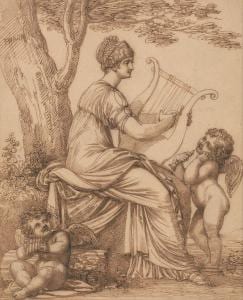Sappho, according to the little we have of her writings, knows the power of mighty Aphrodite. In the fragments that remain, she is piercing, passionate, and a pure lover of beauty. If the good, the truth, and beauty are necessary to a whole soul, then Sappho is an acolyte of truthful beauty.
 We know nothing of her life really, only the pieces of her poetry, but that is enough to pause, read, and appreciate. As with the the violence in Iliad, no lover of wisdom will uncritically embrace the Sappho we have. This woman, one of the first women’s voices, loved women and women goddesses.
We know nothing of her life really, only the pieces of her poetry, but that is enough to pause, read, and appreciate. As with the the violence in Iliad, no lover of wisdom will uncritically embrace the Sappho we have. This woman, one of the first women’s voices, loved women and women goddesses.
What did that mean in a pagan culture?
Best reason, revelation, and most of present humanity might disagree. Plato, Homer, and Aristotle are also problematic: Plato May seem to condone infanticide, Homer in Iliad may glorify war, and Aristotle certainly thinks there are natural slaves. Few books are perfect and even those books must be read with care as we are apt to misread.
Beauty is good and the beauty must be admired, because beauty, in so far as it is true beauty, is of God. The poetry of Sappho is profound when it comes to beauty and it would be a shame if Victorians or secular moderns would trap the authentic voice in what we demand she says. There is virtue to Sappho, though also danger. The danger is mighty Aphrodite: We romantics must pause. We cannot worship passion, because reason, the Divine Logos, checks us. We can, however, venerate beauty, a pathway to God.
Sappho said what she said and we can learn from that voice. The virtues of the body and of the joy of being a woman: the beauty of being a woman is joyous. I cannot know this joy except through the power of the verse of Sappho, the oldest woman’s voice in the West of the World.
A man who is beautiful is beautiful to see but a good man at once takes on beauty.
And again:
Eros loosener of limbs once again trembles me, a sweetbitter beast irrepressibly creeping in.
Or:
I hoped for love When I look at you face to face not even Hermioni seems to be your equal. I compare you to blond Helen among mortal women. Know that you can free me from every care, and stay awake all night long on dewy riverbanks
We cannot just follow desire wherever desire leads. Reason stands guard with revelation supplementing reason, but beauty also is to be celebrated. So Sappho, a woman wise like Diotima, is also historical. We look, as Saint Basil suggests, for the virtue in Homer and in Sappho, the beauty. The excellence of Sappho is found in a recognition that the body counts and not just the mind. Beauty is as great as truth, just as truth matters as much as beauty!
Beauty moves people and so beauty counts, not just as a warning, but as a joy. Sometimes, God help us, we privilege what we “feel” over what our bodies are. We think our thoughts about who we are matter more than what our bodies are.
No. And so we turn to a past that did not have our categories or assumptions. We look to the text to see what other wise voices have thought.
We ask for the voices of the past, the wise voices, and if we ask, we must listen to Sappho:
Come holy lyre speak to me and become a voice!












